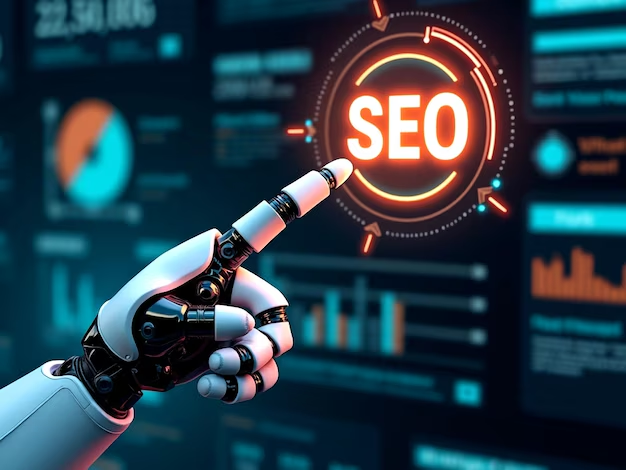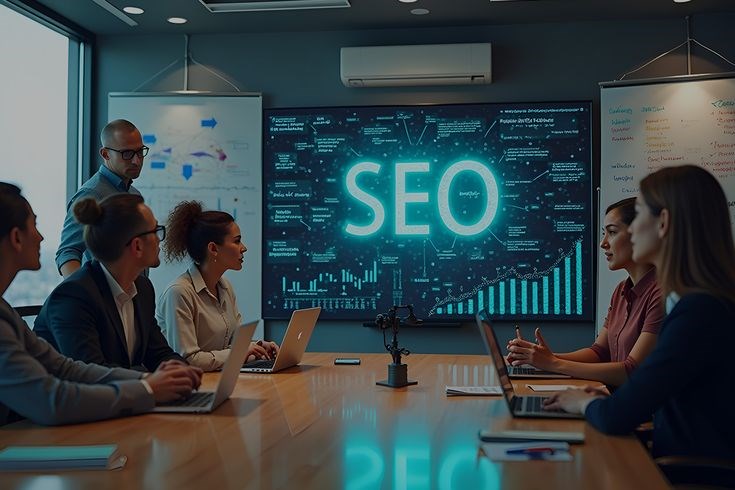
AI powered SEO is no longer a dream. Artificial intelligence technologies powered by large language models, AI summaries, and data-based optimization are now being used in search engines and SEO software to improve user experience. As a result, marketers need to adapt to the changing AI SEO trends to remain visible as the traditional SEO is getting a revamp.
SEO specialists no longer rely on a single search engine but on multiple intelligent systems that interpret and deliver information in real time.
Artificial intelligence has not replaced SEO. It has changed how it works. Every stage of optimization, from discovery to conversion, now relies on how well a brand can communicate value to both users and algorithms.
Businesses that recognize this shift are creating content that performs well in AI summaries, answer engines, and conversation-based search.
The following five AI SEO trends explain how artificial intelligence is transforming the future of SEO in 2025 and ahead.
Biggest AI SEO Trends To Follow in 2025-2026
Here are the major AI SEO trends that are shaping the future of search:
1: AI Overviews Are Replacing Traditional Search Rankings
AI Overviews have quickly become one of the biggest changes in how Google displays information. When users perform a search, they see an AI-generated summary that combines data from multiple websites.
With AGI SEO rising, ranking in the top ten search results is no longer the main target; what matters now is being included within the AI Overview itself. As growth marketing agency Brenton Way suggests, AI answers are now mainstream with 13% of queries triggered by an AI Overview.
Moreover, AI Overviews are now responsible for a decline of around 30 to 35 percent in click-through rates for pages that previously held top rankings. At the same time, over 40 percent of searches in the United States end without a single click, indicating that users are finding the answers they need directly in the AI-generated content.
The purpose of AI generated answers is to save users time by giving them concise, factual explanations. For marketers, however, the goal has shifted.
Interestingly, smaller websites are beginning to gain visibility because AI Overviews draw from a wider set of sources than traditional search results. Many summaries cite over ten different domains, creating new opportunities for emerging publishers that provide high-quality, well-structured insights.
To adapt, SEO strategies must emphasize clarity, structure, and expertise. Schema markup, headings that mirror user intent, and short, factual paragraphs help AI systems interpret content accurately. When an overview relies on your website to support an answer, that mention can generate far greater awareness than a simple ranking position. Visibility in 2025 is about being understood and trusted by artificial intelligence just as much as by human readers.
2: Authenticity and Real Experience Are Now the Core Drivers of Search Trust
Search engines are giving unprecedented importance to authenticity and real experience as signals of trust. Google’s quality guidelines continue to center on Experience, Expertise, Authoritativeness, and Trustworthiness (E-E-A-T), and data from multiple audits confirms that these elements strongly correlate with visibility. Websites that demonstrate verifiable author credentials and first-hand expertise record up to 40 percent higher engagement times and 25 percent lower bounce rates compared to content that lacks identifiable human input.
The rise of AI-generated writing has made originality even more valuable. Over 60 percent of users now report preferring content written by verified experts or professionals with clear real-world experience. This behavioral shift is reflected in Google’s algorithm updates, which promote content that contains personal examples, case studies, or direct observations. AI-generated text without human validation tends to receive limited long-term ranking stability, as search systems interpret it as less trustworthy.
3: LLM SEO Is Emerging as the Next Frontier of Digital Discovery
Large Language Models have created a new search ecosystem. Tools powered by these models such as ChatGPT, Perplexity, and Gemini are now serving as direct information sources for millions of users.
ChatGPT’s integrated search receives about 180 million visits per month, while Perplexity’s active users have reached 15 million, marking a 71 percent rise in referral traffic to websites within a few months. These platforms are rapidly becoming a secondary layer of search, where people ask questions conversationally and receive summarized, cited responses instead of scrolling through results pages.
This change has given rise to what professionals now call LLM SEO, which focuses on optimizing content for retrieval and citation within AI responses. Unlike traditional SEO, which depends heavily on backlinks and keyword targeting, LLM SEO rewards content that demonstrates clarity, structure, and authority. AI models determine which sources to reference by evaluating factual accuracy, topical depth, and brand credibility.
Visibility in this environment extends beyond search engine rankings. A brand mentioned within an AI answer gains trust and exposure even without generating a click. Early research suggests that LLMs could handle between 5 to 10 percent of global search interactions by the end of 2025. This means appearing inside AI generated responses will soon become as valuable as ranking on the first page of Google.
To adapt, content should be presented in a structured, machine readable format. Short, direct explanations supported by data, author attribution, and clear timestamps help LLMs identify reliable sources. The goal is to make your content interpretable not only by readers but also by the AI models that now act as intermediaries between search engines and audiences.
4: SEO, Sales, and Analytics Are Converging into One Unified Growth Strategy
SEO has evolved into a performance-driven discipline that connects directly with business growth and revenue. The separation between content marketing, SEO, and sales is disappearing as companies use AI analytics to measure how organic visibility contributes to conversions and customer acquisition.
68% of marketing teams now track SEO metrics alongside sales data, and organizations. Both functions experience an average 35% increase in conversion efficiency.
AI analytics platforms are reshaping how success is measured. Instead of relying only on rankings or traffic, marketers now evaluate AI visibility, which tracks how frequently a brand appears in AI-generated responses, summaries, or knowledge panels.
Businesses that monitor this metric report 20 to 25% higher brand recall rates, showing that being mentioned in AI-driven content can influence perception even without direct clicks.
The blending of SEO and sales also means that organic content is being built with conversion in mind from the very beginning. Businesses are embedding lead forms, interactive demos, and testimonials within SEO landing pages to shorten the buyer’s journey. As AI systems refine their understanding of user behavior, they reward sites that provide complete, outcome-oriented experiences.
5: AI Assisted Creation Is Reshaping How High Performing Content Is Produced
AI powered writing has become one of the most widely adopted trends in marketing and SEO.
87% of SEO professionals and marketers use AI tools in their content workflows. Moreover, 74% of newly published web articles now include at least some AI generated text.
Companies using AI in their content process are publishing about 40% more pages per month compared to those that rely entirely on manual production.
However, data also shows that higher volume does not automatically lead to better rankings. Studies reveal no direct link between the amount of AI written text on a page and its position in search results. The reason is quality. Search engines prioritize originality, authority, and usefulness rather than automation speed.
About 30% of marketing professionals believe that fully automated content lacks the depth or accuracy required to perform well over time.
The most effective strategies combine AI precision with human insight. AI can analyze trends, generate outlines, or create first drafts, while human editors refine tone, context, and factual accuracy. This balance helps businesses scale production without sacrificing brand credibility.
When used responsibly, AI assisted content creation enhances SEO performance by supporting better keyword mapping, consistent internal linking, and faster response to topical demand. The future of content marketing will not be about choosing between AI and humans, but about how intelligently both can work together to produce content that informs, converts, and builds long term trust.
Conclusion
Artificial intelligence has not weakened SEO. It has elevated it into a smarter, faster, and more strategic discipline. Search visibility now depends on a brand’s ability to create content that both AI systems and human audiences understand and trust. AI Overviews, large language models, and predictive analytics have changed what it means to perform well online.
As a future-focused business, you need to balance technology with authenticity. Combining AI efficiency with genuine expertise produces the kind of content that earns citations, builds credibility, and drives conversions. SEO is no longer about chasing algorithms; it is about aligning human insight with artificial intelligence to create lasting visibility and value.






